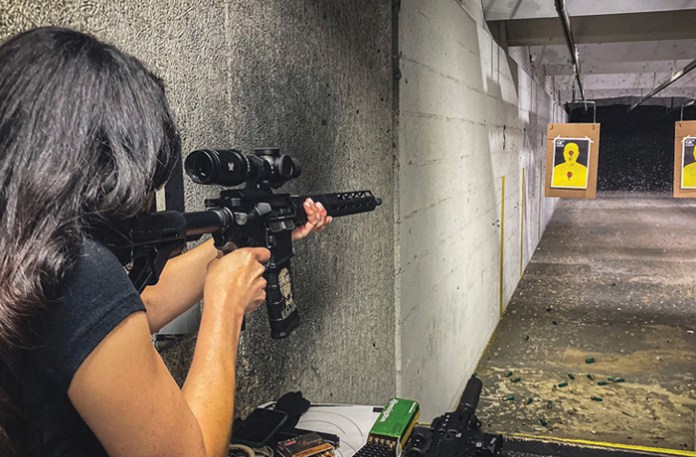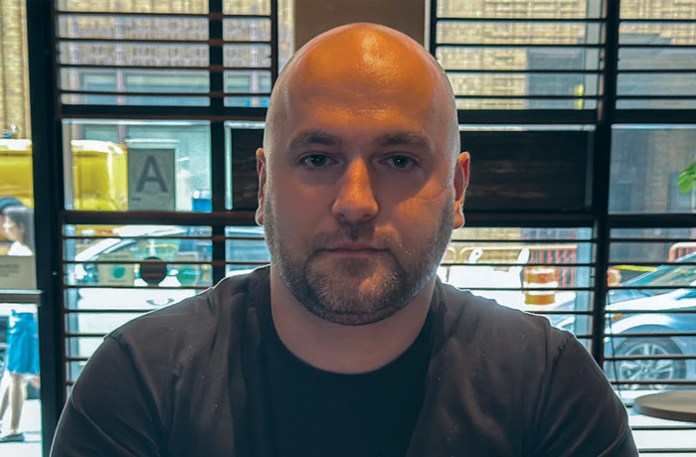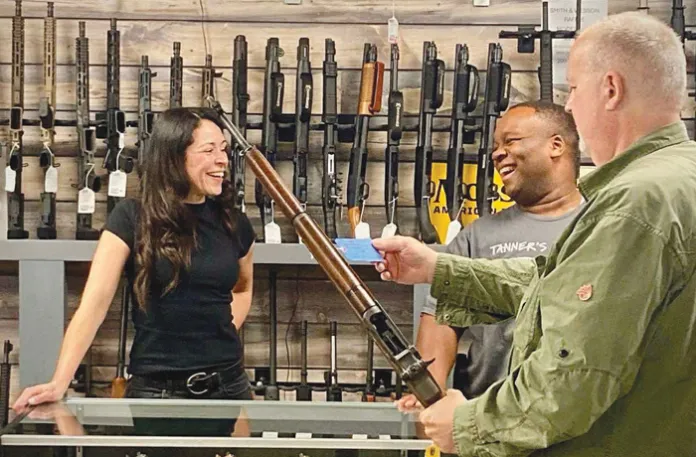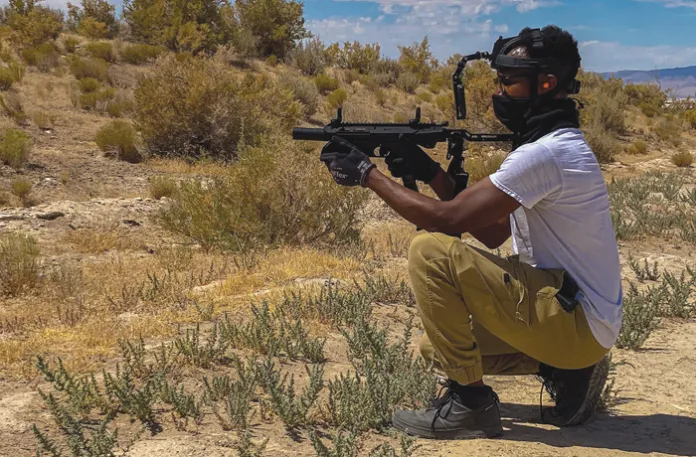The first time Nayara Andrejczyk fired a gun, she fell in love.
It was a revolver, handed to her at a Pennsylvania range after years of quiet fascination — years spent in Brazil, where guns were the domain of criminals, police, or politicians, often overlapping categories. “It was like the forbidden fruit,” she said. “In Brazil, very few people own guns, legally. And I was just … drawn to them.”
She squeezed the trigger, heard the crack, felt the recoil — and then asked to try the next one. And the next.
“Love at first shot,” she said, laughing. “I became completely addicted.”
Soon she was shooting weekly, working at a gun shop, and entering competitions. Today, Andrejczyk is a certified instructor, a divorced mother of two, and the self-proclaimed “Gun Evangelist.”
Stereotypes paint gun culture as America’s most insular tribe: old, white, rural, passing their weapons from one generation to the next. Yet some of its newest recruits are immigrants — from countries where weapons belonged only to criminals or the state, now claiming America’s most contested freedom as their own.
The ‘Gun Evangelist’
Andrejczyk grew up in Vitória da Conquista, one of Brazil’s most violent cities. “Brazil is lawless,” she told me when we met at Tanner’s Sports Center, the suburban Philadelphia gun shop where she works. When her parents’ store was robbed in broad daylight, the police never came. “They’re underpaid, corrupt. If they do show up, they twist the story and take money from you. Most people don’t even bother.”

Her father, a soldier, kept a shotgun hidden in a closet. She never touched it, but it left a mark. “The right to self-defense is paramount,” she said. “And we didn’t have it.”
She emigrated at 19, spending several years in Massachusetts before moving to King of Prussia, Pennsylvania, where the gun laws were looser and ownership more common. “I started questioning: Why do Americans love firearms so much? Why can almost any law-abiding citizen own one?”
Studying U.S. history and the Constitution, she came to see the Second Amendment as less about crime than about government power. “The real reason is tyranny,” she said. “When the people are armed, the government walks on tiptoes. And it should.”
A friend invited her to the range, where the instructor cycled her through revolvers, bolt-actions, and assault rifles. She was hooked. Soon, she joined a women’s shooting club and then walked into Tanner’s and asked for a job. “I don’t know much,” she told the owner, “but I’ll learn fast.”
She did. Within months, she was serving longtime customers and coaching new ones. Women gravitated to her. “Even if all the guys are free, they’ll wait for me,” she said. Before long, she was working six days a week, shooting on weekends, and teaching classes. Her children trained with her, too. Last Christmas, her daughter, now 18, asked for an AR-15. Andrejczyk bought it.
Her zeal earned her a nickname: the Gun Evangelist. “Everywhere I went, I was like a preacher, trying to convert people,” she said. During our interview, she even referred to the Second Amendment as “the Second Commandment” — a slip that showed just how sacred it had become to her.

Data on immigrant gun ownership are scarce, but the demographics of American gun buyers have shifted. Firearm sales surged in 2020, with women and nonwhite buyers driving much of the increase. For many, that year’s chaos made owning a gun feel less like politics and more like a necessity.
Andrejczyk calls guns “the great equalizer,” especially for women. “If someone sees me as a target, I want to put up a fight.” Just owning a gun, she said, has changed her. “I’m more confident than I used to be.”
What bothers her are politicians trying to make ownership harder. “It gives me flashbacks to Brazil,” she said. “If the government can take your guns, they can take your freedom.”
These days, Andrejczyk channels her passion into teaching. One of her recent students was a female rabbi. “She told me, ‘I don’t like guns, I don’t want to own one. But if people are going to be armed in my synagogue, I need to understand what they can do.’” Andrejczyk walked her through the basics. Another possible convert.

(Photo by Daniel Allott)
To see the appeal myself, I joined her on the range. She gathered several students, stressing two rules above all: finger off the trigger until ready, and never point at anything you aren’t prepared to destroy.
“Nayara’s very good, very professional,” said Maria Mitchell, a regular student. “But she’s so sweet.”
Inside, the air cracked with gunfire and brass clinked against the floor. Andrejczyk stood beside me: “Be comfortable, as natural as possible.” She was steady, encouraging. When I fired, she said, “Slowly, gradually pull the trigger — perfect.”
Over the hour, she cycled different handguns and rifles into my hands. The bullets didn’t all hit center mass, but that wasn’t the point. “We’re not here to be precision shooters at our first shot,” she reassured me. In that moment, I saw what her students saw: calm authority mixed with warmth, a teacher turning something dangerous into something empowering.
Last summer, Andrejczyk had a brush with fame when she pulled up to a McDonald’s drive-thru in suburban Pennsylvania and found Donald Trump handing out orders.
“Mr. President, please don’t let the U.S. become Brazil, my native Brazil,” she told him.
When she recounted that moment to me, her eyes welled up. “I have such a love and appreciation for this country. I think it’s the greatest nation in the world. I get a little emotional. I’m going to cry.” She contrasted America’s flawed institutions with Brazil’s “total chaos” and “one of the most corrupt governments in the world.”
At the heart of that affection is her belief in the right to bear arms. “The fact that a common citizen can own firearms and defend their family and property,” she said, “I have no words.”
The realist
At a Brooklyn coffee shop, Zaur Nedashkovskiy leaned across the table, his Russian accent sharpening. “I got a gun to make a statement — because I can,” he said. It wasn’t about sport or even self-defense so much as principle. To him, freedoms aren’t guaranteed unless people can resist tyranny — something his birth country’s history taught him firsthand.
Born in Moscow, Nedashkovskiy spent part of his childhood in North Ossetia, a region scarred by the Chechen wars. His father was killed in the Transnistria conflict of 1992. What stayed with him was how easily the state could crush its people. “Listen, [Russians] don’t have constitutional rights, so [the government] can put whatever laws they want.”
That perspective shaped his view of America when he arrived in Kansas in 2011 and became a citizen six years later. A Muslim and now a network engineer in New York, Nedashkovskiy said he had little interest in party politics — what mattered was the architecture of limits. “Immigrants often appreciate what others take for granted,” he said. “Because of the Constitution, you can trust the courts, you can speak up whenever you want. That’s why people come here.”
His decision to own a gun came in 2020, when BLM riots convulsed U.S. cities. “It was crazy. Cops couldn’t do anything. People felt entitled to assault other people in the streets.”
Two years later, the Supreme Court’s New York State Rifle & Pistol Association v. Bruen decision, striking down New York’s restrictive concealed-carry law, gave him an opening. “Why can’t I have a gun? I thought it was in the Constitution. I wanted the government to see that the count of gun owners [in New York City] goes up.”
Principle aside, the reality can feel sharper. “On the subway, when some guy’s waving shanks in your face — of course I’d have liked to have it on me. But I can’t because it’s prohibited. You’re better to have it than not. A lot of crimes happen because perpetrators know you’re not carrying.”
New York’s licensing system, he found, was “atrocious.” He began an application in 2022, abandoned it, tried again in 2024, and finally got approval this year. The process was so opaque that he turned to Reddit for guidance. “They make it hard not only to go through the process but even to understand the process,” he said. Character references, endless forms, months of waiting — all designed, he believed, to wear applicants down. After threatening legal action, his license finally came through in February. It felt, he said, “like winning a battle somewhere.”
As we spoke, the coffee shop was filling, mugs clattering, voices rising. Our open talk of firearms and Russian politics made me want to lower mine. Nedashkovskiy didn’t. “If you don’t make your voice heard in the right way, then they’re going to think that it’s OK,” he said. “And it’s not OK.” He leaned back. “That’s what sets us apart. Especially first-generation immigrants. We may not like the law, but we respect the law.”
“Any constitutional right is equal to me,” he said. “If it wasn’t guns, it would be speech. You cannot have a government body telling people what they can and can’t say. That’s a no-go. The Constitution protects all of it.”
Asked if he could ever imagine not owning a gun, Nedashkovskiy looked at me like the question made no sense. “No, I’ll always own,” he said. “It’s like, do I always want to speak up freely? To me, it’s a weird question.”
The GunTuber
Plink. Plink. Plink-plink-plink.
Bullets rang against steel in the desert outside the Great Salt Lake as Joseph Osse filmed another YouTube clip. A 32-year-old Haitian immigrant, he hid his face behind a ski mask. He wasn’t just practicing — he was performing, building an audience one burst at a time.
Osse came to the United States as a newborn and was raised in California by his father, an Air Force mechanic who had immigrated and earned citizenship. Guns weren’t part of his childhood. His curiosity came later, through hours of Halo and Call of Duty on a PC with a big enough screen. “It’s a one-to-one,” he told me. “Very realistic.”

When work brought him to Utah in 2021, everything changed. The crime rate was low, the desert ranges vast, and the gun laws looser than in California. “It almost feels like a whole other country,” he said. He liked that he could look up his rights on the state website — open carry, constitutional carry, no disclosure requirements — and then go test them out. The enhanced gun rights here were “definitely a bonus.”
His first purchase came in 2022, just after the Uvalde, Texas, school shooting, when then-President Joe Biden renewed calls to ban AR-15s. “I felt like these are outside forces, controlling my rights,” he said. So he bought a rifle. Then a Glock. “I thought, ‘If I don’t get one now. I may never be able to.’”
Soon, he was filming in the desert. The formula was simple: ski mask, ear protection, gun in hand, steel plates ringing in the background. No political speeches, just the sound of bullets hitting metal. He now has more than 2,600 subscribers and 800 videos, most only a few seconds long.
For Osse, the appeal is less about recognition than sharing what he calls “the joys of guns, plain and simple.” His clips are part of a sprawling YouTube subculture dubbed GunTube, where firearms content racks up billions of views. Once the domain of veterans and shop owners, it now draws a younger, more varied crowd of creators focused on personal protection and tactical know-how.
Asked if being Haitian-born shapes his views, he didn’t hesitate. “Absolutely. It makes me appreciate my U.S. rights,” he said, pointing to Haiti’s collapse. “If you don’t have a weapon, you are at the mercy of whatever the gangs want to do to you or your loved ones. What do we do if something similar happens in the U.S.?”
What fascinates him most about firearms is also what makes him cautious. “The immediate responsibility and power of life and death,” he said. “If you’re a good-hearted person, you don’t have to ever worry about using it.”
He isn’t a political firebrand. “I got my opinions, but I mostly keep it to myself.” Still, his convictions are clear: “We are not slaves, and we have a God-given right to protect ourselves. To choose not to own a gun is fine, but to take others’ rights away is absurd.”
For now, his main concern is practical: more bans. He’s stocking up on what he fears might soon be prohibited.
One August afternoon, he drove me west of Salt Lake City, toward Stansbury Island, where a few other shooters dotted the flats.
Osse shoots about four times a month, with no fixed schedule. What draws him back is partly the gear, but it’s also the calm. “It’s nice and peaceful. … You can just turn the world off.” For him, shooting is recreation and meditation. “Some people like to hike. … This is my nature time.”
He smiled at the steel plates in the distance. “I like being out here and not thinking about nothin’ and just hitting some steel.”
The cautious carrier
Ray P.’s decision to carry a gun came during the COVID-19 pandemic, as videos showed Asian Americans being knocked to the ground while prosecutors declined serious charges. “That’s when my worry came back up,” he said. “Got to protect myself. Got to protect my wife.”
In California, immigrants overall remain less likely to own firearms — about 6% compared to 18% of all adults statewide. But Asian American ownership spiked in response to pandemic-era hate crimes.
Ray, a 45-year-old South Korean immigrant who has lived in California since childhood, was one of them. He already owned a gun, but the surge of attacks, combined with the Supreme Court’s Bruen decision, which made it easier to obtain concealed-carry permits, pushed him to apply for one. “I hope never to have to use it,” he said. “But better to have it and not need it than the other way around.”
Ray was 5 when his family left South Korea for Los Angeles. They settled in a Korean enclave, but his parents pressed him to assimilate. They were archetypal immigrants: hardworking, traditional, intent on keeping their heads down.
That creed was upended during the Rodney King riots. Until then, Ray had seen guns only in movies. Suddenly, he watched Koreans on the nightly news, people who looked like his parents, standing on rooftops with rifles and handguns to defend their stores. One man in a vest fired into the air, and Ray recalls, “That just blew my mind.”
What struck him even more was his father’s reaction. Watching the footage, his father said it was good that those shopkeepers were armed. “Only in this country can immigrants like us defend our livelihoods and our lives,” he told Ray. “No other government would trust us to do that.”
For Ray, it was a revelation. “That was when I realized good guys can own guns too,” Ray said.
Years later, early in his tech career, Ray became the target of a fired manager’s threats. “What worried me most was that the guy probably knew where I lived.” Dating the woman who later became his wife, Ray decided he needed protection. A police officer friend told him a restraining order was useless and instead taught him how to shoot. “Oh, I was shaking,” Ray recalled. “Every shot I flinched. I remember thinking, ‘Oh my God, I’m holding something that can kill someone.’”
Pandemic-era attacks against Asian Americans didn’t so much surprise him as confirm an old fear. “No matter how American we are, we’ll always be seen as outsiders.” What did surprise him was the timing: Just as Bruen made it easier to carry, California legislators moved to claw it back with Senate Bill 2, which effectively banned concealed carry almost everywhere. Ray applied quickly, trained, and qualified before the law took effect. “I was livid,” he said. “The one means I had to protect my loved ones, they came to take away as soon as it was granted.”
The fight left him politically unmoored. He once leaned Democratic but now felt abandoned. “I don’t identify with either side — they don’t care about me. Just another tally on the Asian American experience: you never truly belong.”
Ray doesn’t see guns as a hobby. If anything, he sees them as a burden. “To this day, I still feel a little bit of fear when I carry,” he told me. “I think it’s healthy to hold that fear and never get complacent.”
He practices to stay sharp, but shooting isn’t fun. “It’s more like going to the gym. It’s something I feel like I should do.”
Carrying, he said, even changes how he drives. “If someone cuts me off — normally I might honk, flip them off. But when I’m carrying, I just hit the brakes and let it go. Because when you’re carrying, the backstop becomes lethal force, and there’s absolutely no chance I want to deal with that.”
For him, restraint is the point. “I don’t feel empowered. I don’t feel obligated to play hero. It’s just to get me and my wife out, if it comes to it.”
He knows gun owners are often judged by their worst examples, but insists most are like him — cautious, quiet, and rule-bound. His wife, once shaken, came to trust his caution. “She knows I’m not irresponsible,” he said. “Ninety-nine percent of the time, the guns are in the safe.” His parents know he owns a gun, but not that he carries, and he has no plans to tell them.
Ray also accepts regulations that many gun owners resent. “Against the mantra of the Second Amendment folks, I do believe certain safety checks should be in place. If you can’t navigate those hoops, maybe you shouldn’t be owning a gun.” Watching unsafe shooters fail qualification tests hardened that view: “This is a big responsibility, and people die if you don’t take it seriously.”
Ray works as a software engineering manager in Silicon Valley. At work, he keeps quiet about guns — a target-shooting club was shut down years ago in the name of maintaining a “respectful workplace.” “I tend to be selective about who I talk to,” he said.
For him, gun ownership is neither celebration nor crusade. “It’s a necessary evil,” he said. “If you have loved ones, you need to be ready to protect them.”
If his younger self could see him now, Ray said, he wouldn’t be shocked so much as proud — proud to be living in America, exercising rights he never imagined he’d claim. “I have a good job, a wife I love, and I feel competent and able around a gun, which I never thought I’d be able to say. More pride than surprise would be my reaction.”
America’s gun culture is often cast as a pathology. To these immigrants, it looks more like proof of promise — a nation willing to trust even its newest citizens with the power to defend themselves.
Daniel Allott is the former chief opinion editor at the Hill and the author of On the Road in Trump’s America: A Journey Into the Heart of a Divided Nation.
